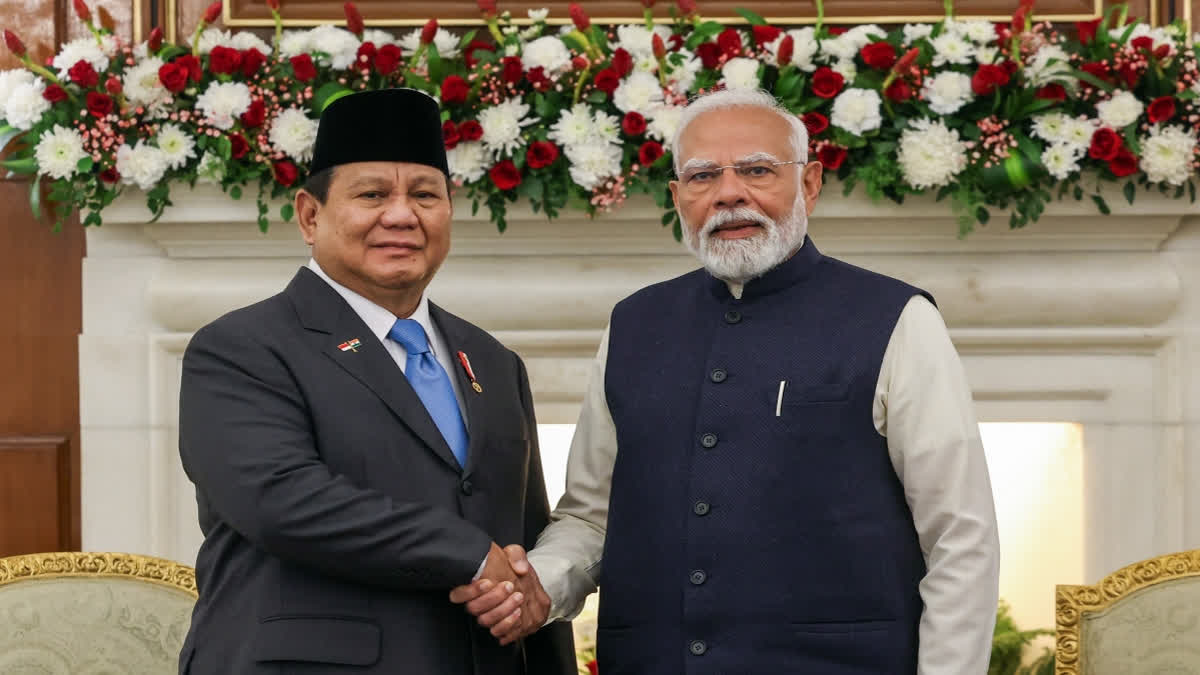New Delhi: Though maritime security and defence cooperation were expected areas of discussion during the delegation-level talks between Prime Minister Narendra Modi and visiting Indonesian President Prabowo Subianto here on Saturday, healthcare and medical cooperation between India and the Southeast Asian nation garnered a significant amount of attention.
Among the several bilateral documents that were exchanged following the talks, there was one between the Ministry of Health and Family Welfare and Indonesia's Ministry of Health.
"Indonesia is very keen to not only cooperate on the policy level on health but the government also wants to attract Indian hospitals to open hospitals in Indonesia," Jaideep Mazumdar, Secretary (East) in the Ministry of External Affairs, said during a special media briefing on President Subianto’s visit here after the talks.
"They would like to have their doctors being trained and exposed to our health system, to undergo internships, to send students here, to send practising doctors here, technicians on equipment and a whole host of different areas under health," Mazumdar said.
Indonesia places significant importance on health and medical cooperation with India for a variety of strategic, economic, and cultural reasons. These include shared regional interests, mutual benefits in medical research and innovation, and the practical needs of both countries to improve their healthcare systems.
As two of the largest and most populous countries in Asia, Indonesia and India share common interests in enhancing regional stability and fostering closer ties within the Indo-Pacific region. Both nations have a strong commitment to multilateralism, and their collaboration in sectors like health, science, and technology serves as a critical element of broader diplomatic ties.
Indonesia, as a prominent member of the Association of Southeast Asian Nations (ASEAN), seeks to strengthen its role in regional affairs, and India, with its growing influence in Asia, shares similar aspirations. By working together on health-related matters, both countries can better address common health challenges in the region, including epidemics, emerging diseases, and public health concerns.
Cooperation with India enhances Indonesia's ability to influence global health governance, especially through forums like the World Health Organization (WHO) and other international bodies. Joint efforts can amplify their voices on the global stage and help shape international health policies that benefit both nations.
Both Indonesia and India face similar public health challenges due to their large populations, diverse geographical settings, and developing healthcare infrastructure.
Both countries deal with infectious diseases like tuberculosis, dengue, malaria, and other communicable diseases. By cooperating on surveillance systems, research, and early warning systems, they can better prevent and control the spread of these diseases across borders.
With rising rates of chronic diseases like diabetes, hypertension, and cancer, both countries are also focusing on addressing non-communicable diseases (NCDs).
India is widely recognised as a global leader in the pharmaceutical industry, particularly in the production of generic medicines, vaccines, and affordable medical supplies. Indonesia, as a large developing nation, stands to benefit greatly from access to these high-quality, cost-effective medical products.
"The Prime Minister’s Jan Aushadhi Kendras was also discussed and how these could be something that Indonesia can look at," Mazumdar said during the media briefing. "So, the health field is something that has tremendous potential which Indonesia is very keen to replicate from India."
India's Pradhan Mantri Bhartiya Jan Aushadhi Kendra scheme ensures quality generic medicines available at affordable prices to all citizens. Under the scheme, dedicated outlets known as Jan Aushadhi Kendras are opened to provide generic medicines at affordable prices.
"President (Subianto) was also very keen about medical colleges being set up in Indonesia," Mazumdar said. "We understand that the Indonesian government is in contact with hospital groups in India for setting up tertiary hospitals and specialist hospitals. At least one group that I am aware of is very advanced in discussions for doing that. And this is an area where the Indonesian government feels that it can gain a lot from our hospital expertise."
It is worth mentioning here that Indian companies are interested in sharing their expertise in the fields of capacity building, public healthcare, manufacturing of drugs, training of doctors and technicians in Indian hospitals, specialty services, digitalisation of healthcare by offering e-health platforms or advanced areas like biomedicine and wellness through AYUSH (ayurveda, yoga and naturopathy, unani, siddha, sowa rigpa and homoeopathy).
Indian international healthcare brands like Apollo Hospitals are working with the Indonesian Mayapada Hospital group for building a green hospital in the Southeast Asian nation's new capital Ibu Kota Nusantara (IKN) for clinical collaboration, providing capacity building, technical training, hospital management services and for collaboration to make affordable and quality healthcare available to Indonesian people.
Artemis has signed a memorandum of understanding (MoU) with Perkasa Hospital Services Indonesia that will offer services for Indonesians to get treated in India. Exports of pharmaceuticals and medical devices to Indonesia have risen from $167.01 million in 2020-21 to $230.41 million in 2023-24. India holds the third position among Indonesiaʼs import partners.
"This (healthcare and medical cooperation) is an area where the Indonesian government feels that it can gain a lot from our hospital expertise," Mazumdar said. "Even the interning of their doctors in our medical system would be of advantage to them and Prime Minister (Modi) offered full support for that."
President Subianto will be the chief guest at the Republic Day parade in New Delhi on Sunday.



